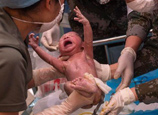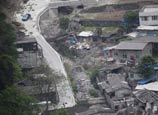
BEIJING, April 23 (Xinhua) -- Social media, flourishing as never before in China, is incurring love and hate as disaster relief enters full swing following Saturday's major earthquake in the country's southwestern Sichuan Province.
At 8:02 a.m. Beijing time on April 20, a magnitude-7.0 earthquake shook Lushan County, a densely populated area under Sichuan's Ya'an City. As of 6 a.m. on April 23, it was confirmed the quake had left 193 people dead, 25 missing and 12,211 injured, while razing lots of houses to the ground, according to the Sichuan provincial civil affairs department
Communications facilities were damaged, just as happened in the magnitude-8.0 quake that struck Wenchuan, a county 85 km away, five years ago. This time, however, people outside the mountain-surrounded Lushan were no longer in total darkness about situations in quake-hit areas. They had a new weapon in their communications arsenal.
Social media, particularly the vastly popular Sina Weibo (China's Twitter) and WeChat (a similar microblogging service), amazingly maintained online services in many of the impacted areas. They were used to spread instant information despite the chaos, at a time when mobile phone calls were often jammed.
The open lines of communications have showed both the good and bad of social media, credited with providing essential, potentially life-saving information, but also demonized as a platform for spreading scurrilous rumors.
Six minutes after the quake, an Internet user with the subscribed web name "Meaningless - So Much Guff" sent a microblog message via mobile phone, with photos of damaged houses, from Lushan, the worst-hit county. "I think I'm gonna to die! The epicenter is surely here in Lushan. My house has collapsed!" the netizen posted.
At 8:42 a.m., another microblog subscriber from the county, with the web name "Qingyi Riverbank," reported "Lushan is hit by earthquake. A large number of houses have fallen down around me. People are hurt. We need help!" The message was forwarded about 80,000 times on April 20.
Just after 10 a.m., Li Zhizhu, a freshman at Chengdu University of Information Technology, blogged a call for help from Shangli, an ancient town in Yucheng District of Ya'an. "The bridge has snapped in two," Li wrote. "About 1,000 students who were painting field sketches here are trapped. We are in danger, surrounded by mountains, likely to meet mudslides. Please forward my message." Within two hours, Li' s message had been forwarded by 200,000 mobile phone users.
In the face of serious natural disasters like earthquakes, social media has become a major channel for people to obtain information and seek help.
By the same token, the government has favored social media to rapidly release information. Just one minute after the quake, the China Earthquake Networks Center had released via its microblog the result of an automatic reading of the phenomenon. It said Ya'an was hit by a magnitude-5.9 quake, promising a full report would follow soon.
According to professor Zhou Xiaozheng with Renmin University, "Open information disclosure in this manner has shown the government's respect for people's right to know. Open information helps to reassure the public and enhance people's confidence in a crisis."


>>>Quake-hit China grows in pain
The principle of sparing no efforts to save lives cannot be more stressed. No minute or even second should be delayed during the "golden rescue period" in the first 72 hours after the quake.
>>>Pilot cancels wedding to participate in quake relief
When the 7.0-magnitude quake happened, Zhang Shangnian, a pilot from an aviation brigade of Chengdu Military Region, was about to hold his wedding.
>>>Nurse returns to work after losing mother
Just likes other medical staff, she was busy with rescuing people injured in the earthquake in SW China, but no one knew her mother just died in the quake.
>>>Wedding ceremony without bridegroom held on schedule
Zhuo Jia, the bridegroom, is a solider of the Chengdu Military Region; he had to leave his beautiful bride behind to participate in earthquake relief.
>>>An injured girl's smile moves many
"Your smile makes the entire world beautiful,” a photo of a smiling girl with bandage on her head has moved so many Chinese netizens.
>>>Teenager saves mom with his bare hands
The mother moves away a precast slab weighing over 50 kilograms alone to save her son in the earthquake. She said she did not know where her strength came from.
















 Local villagers climb mountains to get relief supplies
Local villagers climb mountains to get relief supplies


![]()
